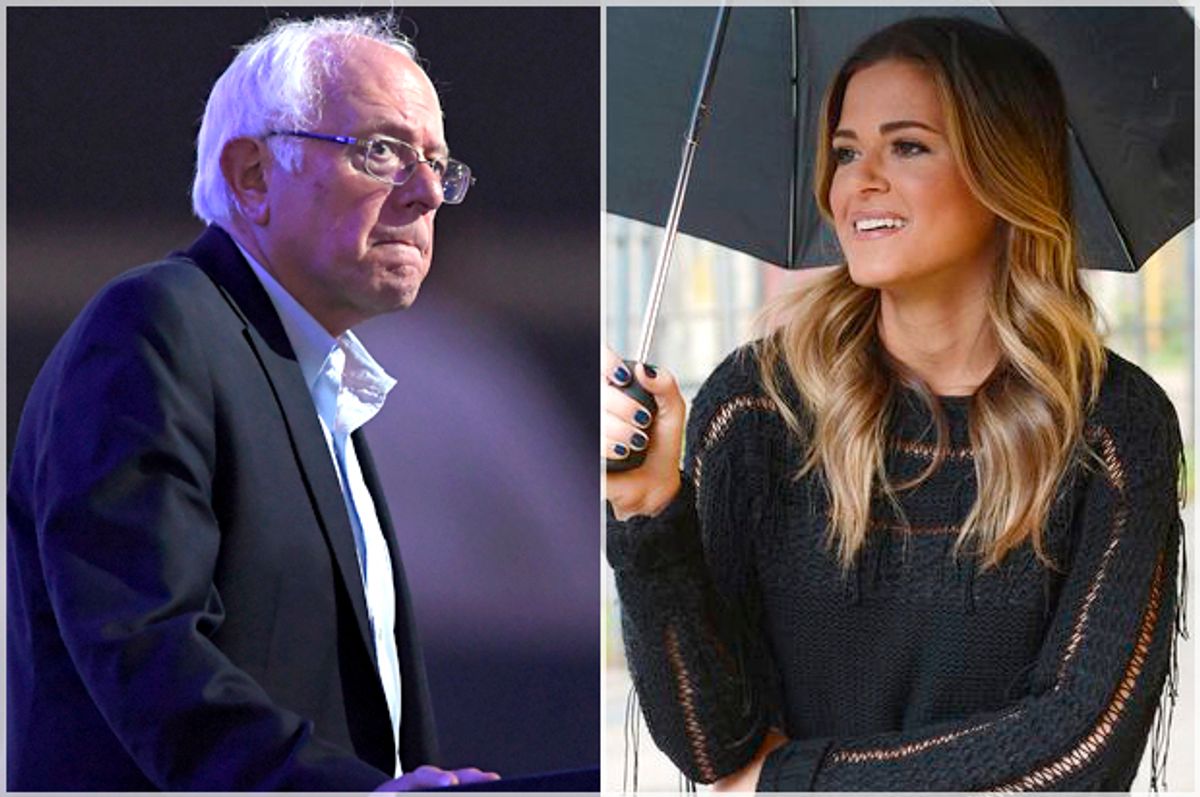Well, this is dispiriting. The news that a number of Twitter users flipped out over the fact that Bernie Sanders’ speech interrupted the broadcast of “The Bachelorette” Monday evening is nearly enough to make you lose faith in the democratic process. Sanders has had to fight Hillary Clinton — the personification of the Democratic party establishment — as well as his own supporters, who’ve resisted his move toward party unity. He’s girded to help the party repel Donald Trump. And now he's being attacked by fans of JoJo Fletcher?
As someone who thinks politics is worth following, especially this year, I’m going to suggest that the Sanders speech was important, whether you like the guy’s policy positions or not. At the very least, it’s more important than a reality dating show that has little feel of actual reality.
But here's another way to look at this: The griping of “Bachelorette” fans is not simply shallow, immature behavior, but rather something culturally logical.
“The personal is the political” has been a mantra of the left for decades now. Rapper KRS-One titled one of Boogie Down Productions’ album “Edutainment.” The right has demonstrated its mastery, too, beginning with Nixon’s use of television, the Reagan administration’s mastery of stagecraft, and the high-energy showmanship of Fox News. There’s always been an element of show business in television news, but it’s exploded in recent years, and the ideology doesn’t make any difference.
At the same time, journalists have devoted themselves to pulling the curtain off of politics and showing what really happens in what used to be rooms opaque with smoke. Politics, we hear, is about “optics” and "shaping the narrative.” Entertainment reporters help us get “behind the music”; Comic-Con panels and TV shows explain how a movie or television show was built.
And while “The Bachelorette” and similar shows don’t capture a very representative slice of life — how many of us really live that way? — they are supposedly “reality” television. Meanwhile, Hollywood actors routinely tell us who they are voting for, what political causes they support, and why feminism or black lives or the right to bear arms matters. Late-night comedians often get into politics better than the traditional newscasts. Stand-up comics are the new social critics or philosopher kings and queens.
So the news has gotten more like entertainment and entertainment has become more infused with ideology and real ideas. I’m not the first person to observe this: Media critic Neil Postman, and everyone who’s looked closely at politics since the 1970s or so, has seen the process taking place. At the very least, there’s been a flattening of everything that’s on television, as programming conforms to the demands of the medium. Let’s leave aside for now whether this is a sign of social progress or a trivialization of the culture.
But one thing we can be pretty sure of is that it’s happening. And that makes the domination of one kind of TV (a silly piece of entertainment that nonetheless makes claims to its “realness”) by another (a speech at a political convention that was itself quite stage-managed) a little more complicated than it seems.
If you’ve been told for your whole life that ideology is everywhere, that politics is about manipulation, that everything is a species of entertainment, why wouldn’t you be upset when one of your favorite shows was interrupted by one you weren’t particularly interested in? Given the way political races are typically covered, doesn’t the fight for the Democratic nomination strike a lot of people as being at least a little bit like JoJo’s choice between Chase, Robby, and the rest?
This all said, I’m hoping some of these Tweets (“Trying to watch the bachelorette and all I see is Bernie Sanders. This is what is wrong with America.”) are just jokes.



Shares